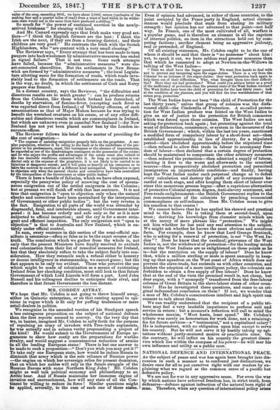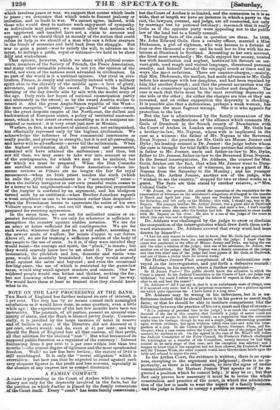NATIONAL DEFENCE AND INTERNATIONAL PEACE. As the subject of peace
and war has again been brought into dis- cussion in such a manner as to confound just distinctions, we desire once for all to put ourselves right with our readers by ex- plaining what we regard as the common sense of a pacific but defensive policy.
We are not for war in any aggressive sense. For even the war by which nations have achieved freedom has, in strict truth, been defensive—defence against infraction of the natural born right of man. Therefore, when any question of international policy arises which involves peace or war, we support that course which leads to peace ; we denounce that which tends to foment jealousy or irritation, and so leads to war. We cannot agree, indeed, with those who would deny to nations such enjoyment of sympathy u individuals may possess ; we cannot allow that nations who are aggrieved and assailed have not a claim to succour and support ; and we should think as meanly of the nation that could refuse its help as we should of a man who saw a fellow creature in the hands of assassins and held back from the struggle. But war to gain a point—war to satisfy the will, to advance an in- terest, to indulge a pride, royal or national—we hold to be sheer folly and wickedness.
That opinion, however, which we share with political econo- mists, members of the Society of Friends, the Peace Association, and many other estimable persons, is not yet the opinion of the world, nor even of the nations most advanced in civilization. In no part of the world is it a national opinion. Our rival in civi- lization, France, is deeply and universally imbued with a military
spirit akin to the chivalry of the middle ages—a love of glory, adventure, and profit by the sword. In Prussia, the highest
learning of the day dwells side by side with the model army of
the age. Italy rests her hopes of national emancipation partly and ultimately in the sword; as by the sword Austria wishes to retard it. And the great Anglo-Saxon republic of the West—
the most energetic, " "cutest," most " go-ahead" of states—owns, like the great despotic empire of the North-east, the dullest and backwardest of European states, a policy of territorial encroach- ment, which is war covert or overt according as it is conquest un- resisted or resisted : it is very overt just now in Mexico. Warfare, in fact, is an instinct of animal man, not extinguished, but effectually repressed only by the highest civilization. We acknowledge the influence of free commercial intercourse as
really pacific, and growing in strength; but it is not all-pervading, and never will be all-sufficient—never till the millennium. When
the highest civilization shall be universal and permanent, mankind will have attained the millennium ; and then, but not till then, we may cease to take war into account as one of the contingencies, for which we may not be inclined, but for which we must be prepared. When the Don Cossacks are enrolled members of the Peace Association—when im- mense reviews at Pilnitz are no longer the fair for royal
amusement—when no Irish priest teaches the sixth (which he calls the fifth) commandment in a "non-natural" sense—
when the railway navigator in our own peaceful realm ceases to be a terror to his neighbourhood—when the practical proposition of the ,burglar is confuted by an argument, and his bludgeon turned aside by an antithesis—when Brother Jonathan regards a weak neighbour as one to be sustained rather than despoiled— when the Frenchman learns to appreciate the satire of his own Voltaire upon war—then, and not till then, we may omit to be prepared for resisting aggression. In the mean time, we are not for unlimited armies or ex- pensive fortifications. We are only for whatever is sufficient to strengthen the country against sudden invasion. We are for
an army at home sufficient for all contingencies. We are for such works, whatever they may be, as will suffice, according to the newest mode of warfare, for points d'appui to our forces.
Above all, we are for training a sufficient portion of the body of the people to the use of arms. As it is, if they were invaded they
would resist—the courage and spirit, the " pluck," is innate ; but
they would scarcely know how to set about it. The poker and broomstick, the pitchfork and hoe, domestic and rustic wea-
pons, would be manfully brandished; but they would scarcely avail against the sabre and bayonet ; and even the occasional fowling-piece, the use of which is restricted by the game-law
taxes, would sing small against muskets and cannon. Our be- wildered people would run hither and thither, seeking the foe; but not knowing when they were making head or lee-way. We would have them at least so trained that they should know what to do.
























 Previous page
Previous page